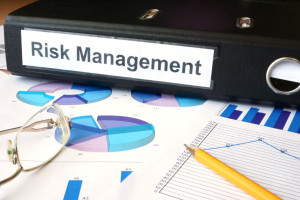Your  company can face risks from just about any area, from employee and client information to building security to fraudulent handling of funds. Here’s how to successfully identify and manage risk at your organization to prevent loss of personnel and revenue.
company can face risks from just about any area, from employee and client information to building security to fraudulent handling of funds. Here’s how to successfully identify and manage risk at your organization to prevent loss of personnel and revenue.
- Risk identification: Risk management starts by identifying and defining potential risks that can negatively influence the company at any level. An example is a data leak that would lead to the company exposing customer data, such as credit card information or addresses.
- Risk analysis: When a specific risk is identified, the company assesses the odds of the risk occurring and what the consequences of it occurring are. When a risk is appropriately assessed, a company can better understand how to prepare for its possibility.
- Risk evaluation: Is the risk acceptable? Is the risk dangerous to the foundation of the company or success of its projects? A company can evaluate the consequences of a risk and work to better understand the answers to these questions.
- Risk mitigation: Companies look at the risks most likely to occur and most dangerous to the business and then work on a plan to both prevent the risk and manage it should it come to pass. This is an important step of the process that often involves consulting with leadership and even an outside risk consultant. Having a smart contingency plan is one of the most important parts of a risk management strategy.
- Risk monitoring: Follow-up is crucial. As a business grows and changes, the risks associated with running it change too. It’s important to never assume that once you’ve planned for something that you can go on auto-pilot and never revisit it. It’s important to track existing risks and account for new ones. The risk management plan should be adjusted and updated accordingly.
Risks can be a huge disruption to your business and make it much harder to meet your goals. Business insurance absolutely helps to protect you against risks that can’t always be prevented. But risk management is important in ensuring that you can file fewer claims and overall deal with less hassle. Our Work Smart program includes best practices information in areas from hiring to pre-incident planning to help your company be better prepared. Give us a call to discuss your insurance options and risk management planning today.

 generates income. Having business insurance can actually help grow your business and strengthen your position with potential customers and clients. It also can help you function more confidently as a business owner, which can improve productivity, clarity of mind, and decision-making.
generates income. Having business insurance can actually help grow your business and strengthen your position with potential customers and clients. It also can help you function more confidently as a business owner, which can improve productivity, clarity of mind, and decision-making. employees. But there are a few simple ways to keep the associated costs under control, no matter what industry you work in.
employees. But there are a few simple ways to keep the associated costs under control, no matter what industry you work in. In today’s economy, it is not uncommon for companies to experience financial difficulties, and some may even have to file bankruptcy or close temporarily. The lucky ones are able to reorganize. Just because a company declares bankruptcy, it is not absolved of all insurance requirements. Here are a few important facts company owners should know concerning insurance, bankruptcy and company reorganization.
In today’s economy, it is not uncommon for companies to experience financial difficulties, and some may even have to file bankruptcy or close temporarily. The lucky ones are able to reorganize. Just because a company declares bankruptcy, it is not absolved of all insurance requirements. Here are a few important facts company owners should know concerning insurance, bankruptcy and company reorganization. might not think about as important, though, is what to know about the shopping and purchase process. Here’s what to keep in mind:
might not think about as important, though, is what to know about the shopping and purchase process. Here’s what to keep in mind:
 Preparing a risk management plan is a foundational part of securing your business. There are many kinds of risks that businesses are vulnerable to, and it’s important to have a plan in place to help mitigate damage and keep your business secure.
Preparing a risk management plan is a foundational part of securing your business. There are many kinds of risks that businesses are vulnerable to, and it’s important to have a plan in place to help mitigate damage and keep your business secure. We’ve all heard that story – the “I didn’t know it wasn’t covered” story. People who get in a car accident didn’t realize that they’re not covered for renting a car while their vehicle is repaired, or homeowners find out they aren’t covered for flood damage when they go to file a claim. How do you keep this from happening to you at your business?
We’ve all heard that story – the “I didn’t know it wasn’t covered” story. People who get in a car accident didn’t realize that they’re not covered for renting a car while their vehicle is repaired, or homeowners find out they aren’t covered for flood damage when they go to file a claim. How do you keep this from happening to you at your business?
 risk – and your potential for needing to file insurance claims in the first place – is with a comprehensive fleet management program in place. Here are some ways to improve your fleet safety to improve your business and increase confidence in your company.
risk – and your potential for needing to file insurance claims in the first place – is with a comprehensive fleet management program in place. Here are some ways to improve your fleet safety to improve your business and increase confidence in your company.